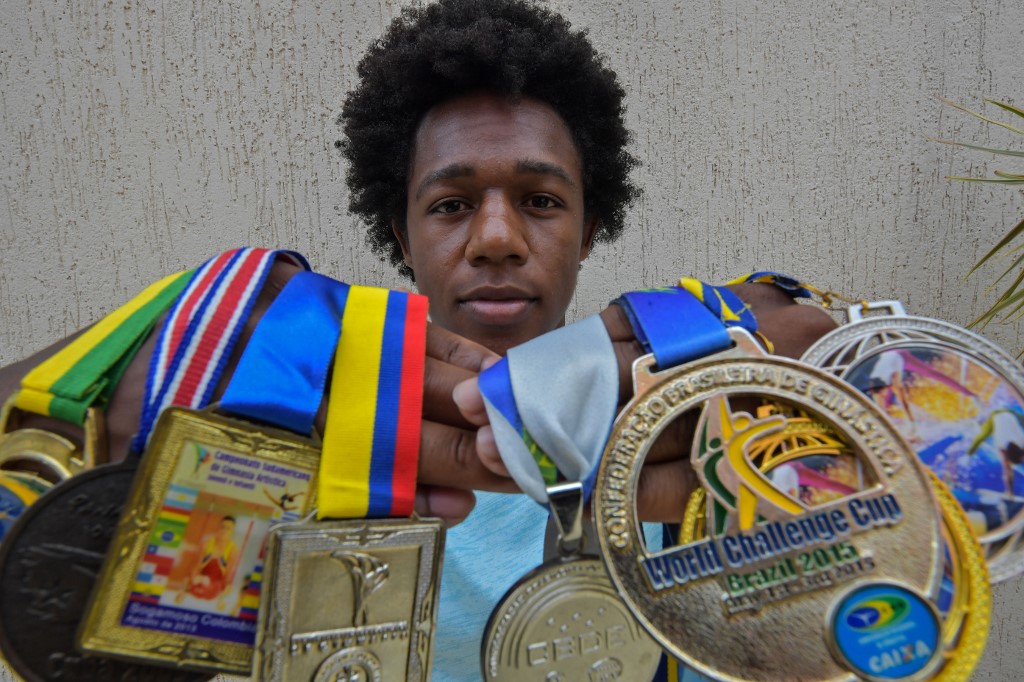Black gymnast says career derailed by racism in Brazil

Brazilian gymnast Angelo Assumpcao shows his medals after a training session at his home on the outskirts of Sao Paulo, Brazil on September 16, 2020. – Assumpcao denounced racism in Brazil and since then his career came undone, according to him. (Photo by NELSON ALMEIDA / AFP)
Brazilian gymnast Angelo Assumpcao still wonders how far he could have gone if not for the decision he says derailed his career: speaking out against the racism he was subjected to by his white teammates.
Could he have made the Olympics? Won a medal? At 24 years old, he may never get the chance to find out.
“Some people think racism doesn’t exist. I wonder where my career would be without it,” he told AFP in an interview.
Assumpcao’s career was as short as it was promising.
A muscular dynamo with an exuberant afro, he grew up on the outskirts of Sao Paulo, Brazil’s economic capital, where he developed a love for gymnastics that soon landed him at the revered Pinheiros Sporting Club.
Located in the upscale neighborhood from which it takes its name, Pinheiros is a veritable institution in Brazilian sport.
Founded in 1899 — just 10 years after Brazil became the last country in the Americas to abolish slavery — it has trained some of the country’s best athletes, including 12 Olympic medalists.
Assumpcao came of age in its elite training academy, a lone black boy learning backflips and dismounts surrounded by white gymnasts.
‘New sensation’
He got his big break in 2015, when he took the place of injured teammate Arthur Nory on the vault at the Gymnastics World Cup stage event in his hometown, Sao Paulo.
Assumpcao won gold, upsetting Brazil’s leading gymnast at the time, veteran Diego Hypolito, who won bronze.
Globo Sports, part of Brazil’s biggest media house, proclaimed Assumpcao “the new sensation” of Brazilian gymnastics.
Days later, though, his celebration was cut short.
Nory put a video on social media in which he and two other young white gymnasts cracked racist jokes with a visibly uncomfortable Assumpcao.
“When your cell phone’s working, the screen is white. When it breaks, what color is it?” a snickering Nory asks in the video.
“Black!” comes the answer.
“The plastic bags at the supermarket are white. What color are garbage bags?”
The video went viral online, triggering outrage in Brazil, a country of 212 million people where 54 percent of the population is black or mixed race.
The Brazilian Gymnastics Federation suspended the three white gymnasts for a month. They later apologized.
But Assumpcao says it was not an isolated incident.
He was regularly mocked for his skin color, hair and Afro-Brazilian heritage, he says.
He pinpoints his decision to speak out against such behavior as the moment his career started to unravel.
He was not selected for the 2016 Olympics, held in Brazil’s second city, Rio de Janeiro. Hypolito and Nory were, taking home medals — silver and bronze, respectively, in the floor competition.
Assumpcao says he sank into depression because of the discrimination he faced.
At first, he kept his complaints behind closed doors, going to Pinheiros directors in private because he feared reprisals, he said.
When he felt the club failed to listen, he went public about the “structural racism” he says prevails there.
– Training at home –
In November 2019, Pinheiros rescinded his contract, saying he was under-performing.
Assumpcao says it was punishment for condemning racism in the gymnastics world.
“You pay a very heavy price when you’re a victim of racism in Brazil, or anywhere in the world,” he said.
“But the oppressors pay a much cheaper price. Look at Arthur Nory. He got to go on with his life.”
Last year, Pinheiros carried out an internal review that confirmed incidents of “racial abuse” and “harassment” at the club, according to a report by Globo Sports.
However, in a statement to AFP, the club denied racism in the decision to cut ties with Assumpcao.
His bitter experiences rushed back recently when another Brazilian, Neymar, accused a defender of using racist insults against him during Paris Saint-Germain’s 1-0 loss to Marseille Sunday.
“That just goes to show that you can be the best athlete in the world, rich and famous, but they still judge you by the color of your skin,” said Assumpcao.
Today, the gymnast trains by himself at home, getting by with the help of donations from friends and family and hoping to get the chance to compete again.